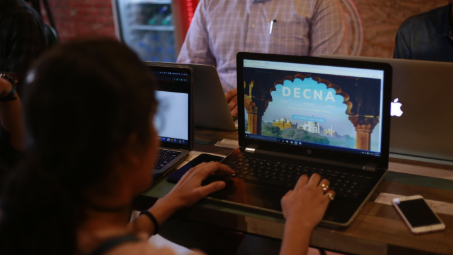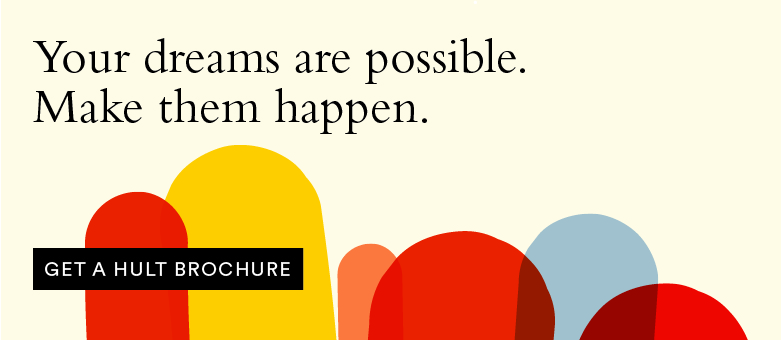Referred to as the “Nobel Prize for students”, the Hult Prize challenges students to find new and disruptive solutions to tackle some of the biggest social issues around the globe.
The competition has seen a rise of undergraduate teams taking part and, despite competing against masters, MBA, and Executive MBA teams, they’ve proven to be strong competition.
We caught up with team DECNA—a group of first year Hult undergraduate students who made it to the accelerator stage of the Hult Prize to find out what they thought of the experience.
Congratulations on making it to the accelerator stage of the Hult Prize! How did it feel to have made it that far?
Zach: It was definitely an honour to represent Hult at the Hult Prize. It came with a lot of pressure and responsibility, but we felt super grateful to have had this learning experience and opportunity to meet so many incredible people.
Mallika: We learnt so much during the experience and absorbed everything we could. There were so many amazing people at the event and even now we’re still making full use of the chance to grow our network.
Marie-Louise: We can use what we learnt during this journey in everything—whether that’s for DECNA, for school, or for the future.
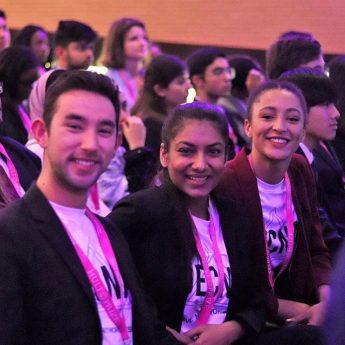

What motivated you to take part in the Hult Prize?
Marie-Louise: Actually, this was thanks to Hult. We took a course called ‘Storytelling & Persuasion’ and we had to do a challenge to create a business to change people’s lives. This is when we came up with the idea of DECNA and we realized that the challenge for Hult Prize was the same thing. We decided to try our luck in the competition!
Zach: I was a volunteer for Hult Prize in 2016 at the Shanghai regionals at the time I was still in High school. I saw all these incredible teams and I really wanted to be a part of one of those teams. I was sitting in the audience watching the teams and told myself that when I entered university I was going to be standing on that stage and I was going to take part in the Hult Prize. So for me, it’s a dream come true.
Mallika: I’d heard about Hult Prize from so many different people. When the challenge we were already working on fit the brief for this year, we were excited to see where we could go.
Can you tell us a bit about what your idea and what is DECNA?
Mallika: DECNA means ‘vision’ in Hindi and our aim was to connect the disconnected unemployed youth to employers through a series of industry showcases.
“We identified a problem and created a solution.”
Zach: We identified a problem and created a solution. Most graduates in India, although they have many skills, lack the skills in relation to professional networking and career development. That’s why they’re lacking in so many jobs and miss so many opportunities. This is why we wanted to up-skill them through our industry workshops and make sure that would shine bright in front of employers.
Employers are spending millions every single year in search for the right candidates but they’re not being effective with their investment. That’s why with us they don’t have to pay for recruiting. Employers come to the event for free and then if they do decide to recruit someone, they pay a commission.
Marie-Louise: The main point about DECNA was the fact it was really innovative. We were the first ever on and off platform and our events were really unique because the events were done in informal settings, giving each party the best of the best.
Mallika: When starting out, it really helped that I’ve lived in the shoes of the customers. I’ve been an Indian high school student myself and all my life I was told how to get the best grades and how to go to the best college. Nobody actually told me how to obtain soft skills, which is what inspired me to create DECNA.
Zach: We were all really passionate about the challenge because of the fact we were providing these opportunities for the youth of today. We are the youth, so the fact that we can really inspire our generation is exciting.
“Day by day we were learning. We had ideas, we took feedback, we evaluated ourselves and the business, and have learnt a lot through the process.”
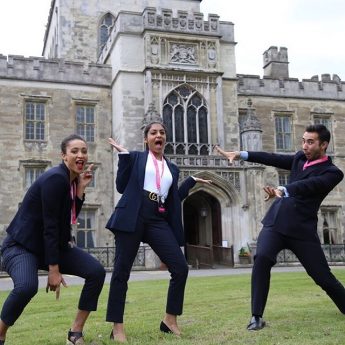
What was the process of getting DECNA off the ground?
Marie-Louise: Day by day we were learning. We had ideas, we took feedback, we evaluated ourselves and the business, and have learnt a lot through the process. It started with our idea at Hult, and it progressed far enough to get us to the accelerator.
What was your biggest challenge?
Mallika: Finding the balance of tasks was hard at the beginning as each member had an area to work on, but we learnt how to prioritize and play to each other’s strengths.
Marie-Louise: One of the biggest challenges was keeping the team dynamic balanced. We are a strong team, but it’s super important to support one another through the highs and the lows. Communication is a huge factor in how successful or challenging growing a business is—you have to communicate with your teammates and, most importantly, understand them.
Zach: One of the biggest challenges for me was receiving feedback. The first week here we were getting six different pieces of advice from different mentors and the biggest challenge for me personally was learning how to pick and choose which feedback we were going to take and act upon, and which feedback we were going to park and wait to implement it later. Obviously, every piece of feedback is useful in some way, but it’s a challenge to stay true to your business when you have so many different people inputting their own ideas and values. You need to believe in your business idea and your team, even when others don’t.
What was your biggest success or defining moment?
Marie-Louise: For me, the defining moment was when we watched a video back of us pitching our idea back at the beginning in our course at Hult. In that pitch, we included everything we’ve been told matters: impact, passion, and a great team dynamic. This pitch defined the essence of DECNA. When we saw this video again, it reminded us of our roots, where we’d come from, and how far we’ve grown.
Zach: The reason we looked back at that video one night was because we had hit a low point after a tough week here. We were scratching our heads about what to do next, but thought perhaps it might be useful to look back at what we’d done before. Seeing that video was our true ‘A-ha!’ moment and we realized that the team we were watching defines us and we shouldn’t forget where we have come from.
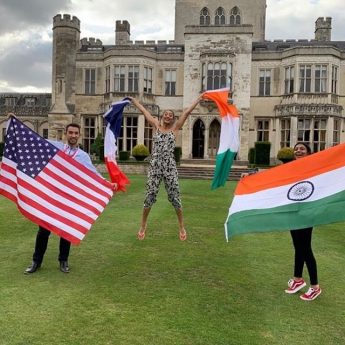

What piece of advice would you give to anyone thinking about competing in the Hult Prize next year?
Marie-Louise: Try! Try hard, work hard, and choose the people you are going to work with carefully. The most important thing, I believe, is to see the potential of yourself and those around you.
Mallika: I’d agree that choosing your team carefully is super important. If you’re an undergraduate, like me, and have an idea but are questioning if you should compete, just go for it. You’re going to learn so much in the process and the lessons are invaluable.
Zach: I’d say be smart. Be smart from the very beginning. Go with it, take the chance, and do your research. Watch the pitches from previous years. By watching the UN finals of the last five/six years, you’ll notice that there’s a pattern in terms of the pitch styles. For anyone considering taking part in the Hult Prize, I don’t think you should copy or confirm to an identity, but I do believe that it’s important for you to understand what it looks like. That way you’ll know what to do and you can hit the ground running. If you do make it, don’t be afraid to ask for help!
The next steps
Team DECNA have learned invaluable lessons, built their business, grown their network, and have done Hult proud during the process of competing in the Hult Prize. They plan to continue to build their business as they progress with their studies.
To keep up to date with the team and follow their progress, you can follow their Instagram.


